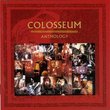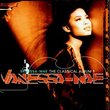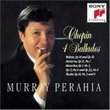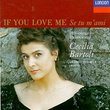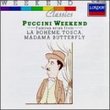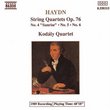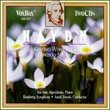| All Artists: Giacomo Puccini, Bruno Bartoletti, John McCarthy, Ambrosian Opera Chorus, New Philharmonia Orchestra, Montserrat Caballé, Ian Partridge, Plácido Domingo, Robert Tear, Bernard Dickerson, Delia Wallis, Gwynne Howell, Noel Mangan, Noel Mangin, Richard van Allan, Robert Lloyd, Vicente Sardinero Title: Puccini: Manon Lescaut Members Wishing: 0 Total Copies: 0 Label: Angel Records Release Date: 8/5/2002 Album Type: Import Genre: Classical Style: Opera & Classical Vocal Number of Discs: 2 SwapaCD Credits: 2 UPC: 077776485225 |
Search - Giacomo Puccini, Bruno Bartoletti, John McCarthy :: Puccini: Manon Lescaut
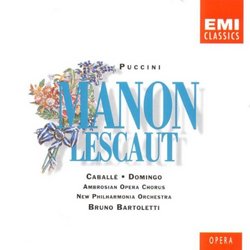 | Giacomo Puccini, Bruno Bartoletti, John McCarthy Puccini: Manon Lescaut Genre: Classical
This disc has most of the right ingredients for a classic Manon Lescaut. Plácido Domingo and Montserrat Caballé in their prime were two of the loveliest Puccini voices of the late 20th century. Their Spanish temp... more » |
Larger Image |
CD DetailsSynopsis
Amazon.com essential recording This disc has most of the right ingredients for a classic Manon Lescaut. Plácido Domingo and Montserrat Caballé in their prime were two of the loveliest Puccini voices of the late 20th century. Their Spanish temperaments only aid in conveying the passion in this story of a love that survives unpleasant parents, religious vows, and arrest, and ends without a shred of dignity in the swamps of Louisiana. The main drawback here is that conductor Bruno Bartoletti, for all of his experience, could've given a fresher account of the score and, in general, the whole thing sounds a bit studio bound. However, operatic decisions are made on the basis of voices, and this set has them. --David Patrick Stearns Similar CDsSimilarly Requested CDs
|
CD ReviewsA static and VERY SLOW but well sung Manon Lescaut Armindo | Greece | 05/18/2003 (4 out of 5 stars) "There is no definite recording of Puccini's first big success. Most Manon Lescaut recordings have things to offer. Who for example can resist Tebaldi or Freni in the title role, Pavarotti as De Grieux and Serafin's inspired conducting? Caballe and Domingo have great voices and this recording captures them in their prime. This raised my expectations for a great all-around Manon Lescaut but I was eventually a bit disappointed. They both tend to make the opera too mellow-ish and this reduces its verisimo excitement. However, I can't say that the singing, especially Caballe's is not beautiful or secure. She, Domingo and the rest of the cast all do their best. Probably maestro Bartoletti is to blame for the somewhat dull result. His tempi are almost everywhere sooooo slow. The opera sounds at times like a lullaby...ZZZZzzzz. If you want to hear them at their best, listen to Caballe in bel canto and Domingo in Verdi/Wagner. As for other Manon Lescaut recordings, try the early Decca recording with the best Manon, Tebaldi (and possibly the least lyrical De Grieux, Del Monaco) or one of Freni's interesting recordings (pity that she and Pavarotti didn't record the opera earlier)." One reason to listen montecastello | Dardanelle, Arkansas United States | 09/17/2003 (4 out of 5 stars) "Bartoletti is an uninspiring conductor, Domingo, though in good voice, is suprisingly boring, and the sound is not as full as one might expect from EMI. But all of that is irrelevant given one thing: Caballe, at her vocal peak, offering the most astonishingly beautiful singing you've ever heard. There are more dramatic Manons and overall more satisfying sets, but once you've heard this one, you'll never want to be without it--for one lush, luxurious reason." A Recording With Peaks and Valleys Timothy Kearney | Hull, MA United States | 08/01/2005 (4 out of 5 stars) "MANON LESCAUT is one of those operas that can sometimes sit on my shelf for long periods of time. At some point, I'll decide to listen to it after I've forgotten how much I enjoy it and it will be like finding a lost treasure.
The opera is still performed somewhat frequently today. While it can stand on its own musically, it offers listeners to discover a different side to Puccini. It was his first work to be a major success and while we do find an accomplished composer, we also see glimpses of what is yet to come in his later masterpieces. There are many great Manons: Callas and Tebald always come to mind but pothers such as Freni, Leontyne Price, and Licia Albanese are among the greats too. There are not as many great tenors who have performed the role of De Grieux at least not recorded De Grieuxs though Bjorling and Carreras have both done noteworthy jobs. As far as this recording is concerned, it is not a bad recording. The orchestral sound is lush and at time scan be majestic. Montserrat Caballe is paired with her compatriot Placido Domingo and while both do an adequate job, it is a bit uneven and at moments where you're waiting for an electrifying performance, particularly the great duet "Tu, Tu, Amore Tu," the recording can fail to inspire. It's not as great as the Callas/DiStefano pairing or the Bjorling/Albanese match, but these recordings are in mono which puts them at a bit of a disadvantage. The Pavarotti/Freni pairing under the direction of James Levineis a popular choice for many listeners, but while it is an exciting rendition, neither of the great stars are in their prime which is not the case for the Caballe/Domingo match, both of whom are at their vocal peaks when this recording was made. So should you buy this recording? It won't be a waste of money, but if you do purchase it, purchase Bjorling's PEARL FISHERS DUET CD or the Callas/ DiStefano duets CD too. This way you'll have a good recording of the complete work and great highlights of the opera's more powerful moments. " |

 Track Listings (18) - Disc #1
Track Listings (18) - Disc #1